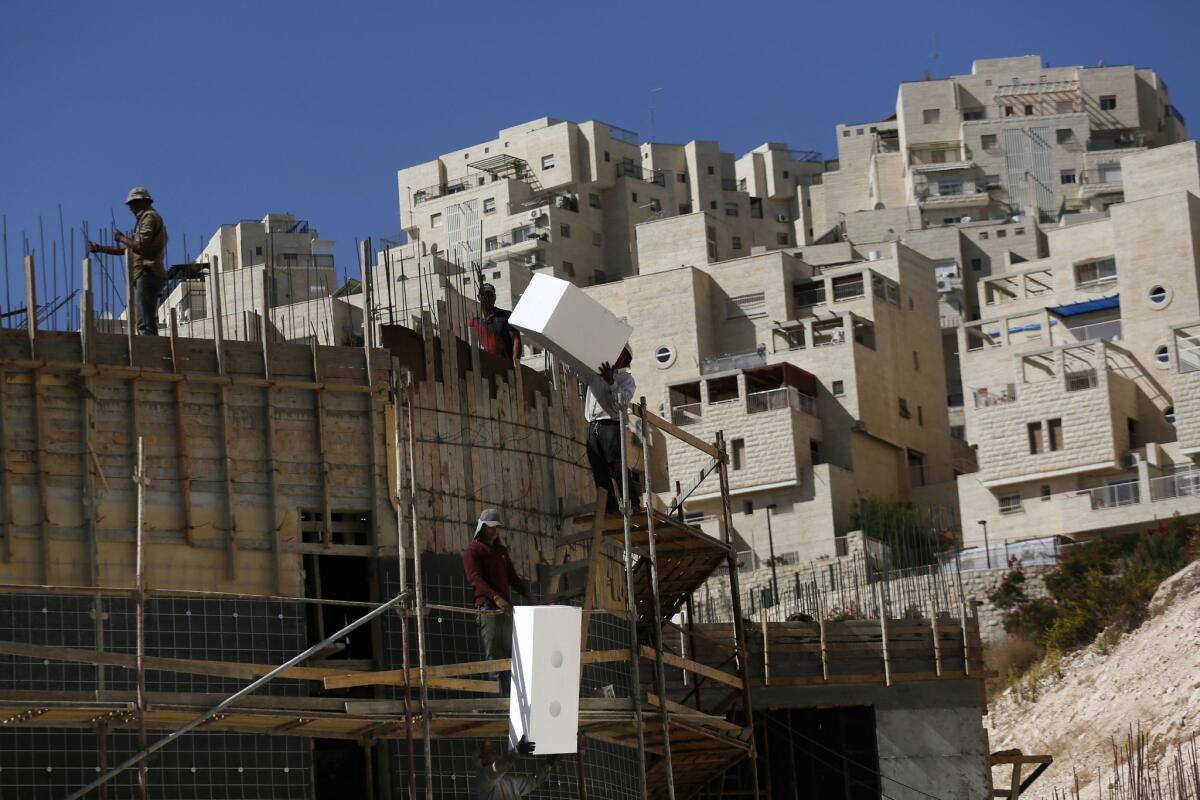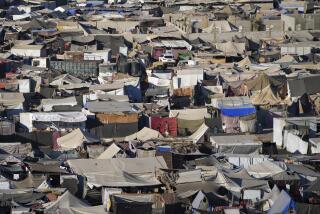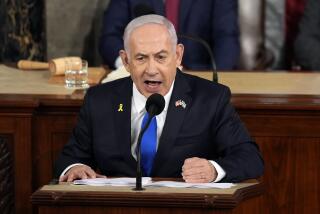Israel announces plans for new construction on disputed land

After breaking for a turbulent summer, Israel’s parliament reconvened Monday for what looks to be a stormy autumn session against the backdrop of tensions with the United States and Palestinians, exacerbated by new plans for construction on disputed land.
Unidentified officials from Prime Minister Benjamin Netanyahu’s office said Israel had decided to advance planning for 1,000 new housing units in Har Homa and Ramat Shlomo, both Jewish developments on lands the Palestinians claim for a future state.
The announcement was framed by local media as a bid on Netanyahu’s part to placate hawkish elements in his government and gain some political respite from his increasingly restive coalition.
“Israel has every right to build in the neighborhoods of Jerusalem. This is consensus, or so I thought,” Netanyahu said later Monday, speaking to the parliament, known as the Knesset. He was apparently alluding both to Monday’s announcement and to domestic and American criticism of the final approval last month for 2,610 new apartments in the Jerusalem area of Givat Hamatos.
Relations with the United States have been frayed by such plans for construction in parts of Jerusalem on lands seized in 1967 and unilaterally annexed to the city.
For some, there is no convenient time for building in Jerusalem, Netanyahu said bitingly. “If it was up to them, we wouldn’t have built a single house there in 60 years because it is never the right time,” he said.
Preexisting tensions within Netanyahu’s coalition have been increasingly evident in recent days, as the political system has geared up to face the conflicting agendas of its members on the peace process, religion and state, and civil liberties.
The collapse of negotiations with the Palestinians, the war in Gaza and regional turmoil have deepened disputes among government members, strengthening each side’s position on efforts to renew talks with the Palestinians.
Economy Minister Naftali Bennett was reported to have recently warned Netanyahu that Bennett’s party, Jewish Home, would destabilize the coalition if the prime minister did not expedite construction in West Bank settlements, which settler groups claim is in effect frozen.
Palestinian officials were angered by news of the planned construction. In Ramallah, senior Fatah official Jibril Rajoub warned that “such unilateral acts will lead to an explosion.”
Jerusalem is already boiling, with daily violence and Palestinian protests that Israeli authorities have vowed to crush. Amid the tension, Palestinian Authority Prime Minister Rami Hamdallah visited Al Aqsa mosque Monday with other Palestinian officials, after receiving permission from Israel.
Although Monday’s announcement said the new plans were a government decision, numerous ministers in Netanyahu’s government hold different positions about sensitive construction.
Justice Minister Tzipi Livni, who heads Israel’s negotiation team in talks with the Palestinians, cautioned against the reported construction plan. “In our volatile reality, it is irresponsible both in terms of security and diplomacy,” she wrote on Facebook.
Finance Minister Yair Lapid warned of the timing and said there was “no need to exacerbate” an existing crisis in Israel’s relations with the U.S. and the world.
Both ministers urged a resumption of peace negotiations with the Palestinians, while the opposition called for them to pull their two parties from Netanyahu’s government.
Opposition leader Isaac Herzog said he held Netanyahu personally responsible for “destroying Israeli-American relations” and harming direct ties with President Obama and the White House. Herzog denounced Netanyahu’s economic policies as well and warned the prime minister would soon “pay with his seat.”
In Washington, State Department spokeswoman Jen Psaki told reporters that while the United States has not heard any official announcement that the new construction plans would proceed, it is “certainly deeply concerned.”
She added that Secretary of State John F. Kerry had discussed the issue with Netanyahu over the weekend, and that the United States was “engaging at the highest levels” to learn more about Israeli plans.
Even before Monday’s announcement of new construction plans, U.S. frustration with Israel became evident with Friday reports that Defense Minister Moshe Yaalon was denied meetings with senior U.S. officials, including Vice President Joe Biden, Secretary of State John F. Kerry and national security advisor Susan Rice, during his visit last week, which did include a meeting with his counterpart, Defense Secretary Chuck Hagel.
The cold shoulder, made public through leaks by U.S. officials just as Yaalon was returning to Israel, was described by Israeli media as payback for comments Yaalon made about Kerry in January, when he called the U.S. diplomat “inexplicably obsessive” and “messianic” in his push for peace talks with the Palestinians.
Yaalon’s remarks were made behind closed doors but leaked, infuriating the Obama administration and leading him to apologize and profess appreciation of Kerry’s efforts. The defense minister is an outspoken skeptic of a two-state solution.
Reports of the snub, dubbed a “hazing” by local commentators, prompted renewed criticism of Yaalon and other blunt speakers within the government.
“The U.S. is the greatest of our friends,” supporting Israel on multiple levels including defense, finance and the increasingly difficult international arena, said Science Minister Yaakov Peri, who called relations with the U.S. “beyond strategic.”
Peri urged top ministers entrusted with relations to exercise extreme caution with Israel’s key ally and resolve any disputes discreetly, before they fester and cause practical damage. “It is all right to have disputes within the family, but these mustn’t lead to divorce,” said Peri.
Poor personal relations can undermine practical issues in the long run, said Peri, advising these to be regarded as “one comprehensive relationship.”
The minister cited Israel’s current concerns, including world powers’ negotiations with Iran, the peace process with the Palestinians and fallout from the war in Gaza, as well as regional issues. “All these are delicate and sensitive issues that call for dialogue and understanding, not crisis,” he said.
In his remarks, Netanyahu criticized the international community for what he said was pressure on Israel alone to make “more and more concessions with nothing in return.”
“Israel will not lose hope for peace but nor will it cling to false hopes,” Netanyahu said. Hamas militants would have been digging tunnels in the heart of Israel “if we had followed every reckless and irresponsible initiative proposed to us every other day,” the prime minister added.
If an agreement is reached with the Palestinians, the only option will be a “demilitarized Palestinian state that recognizes Israel as the Jewish homeland,” said Netanyahu, who stressed that this would be achieved only through negotiations.
Sobelman is a special correspondent.
More to Read
Sign up for Essential California
The most important California stories and recommendations in your inbox every morning.
You may occasionally receive promotional content from the Los Angeles Times.










